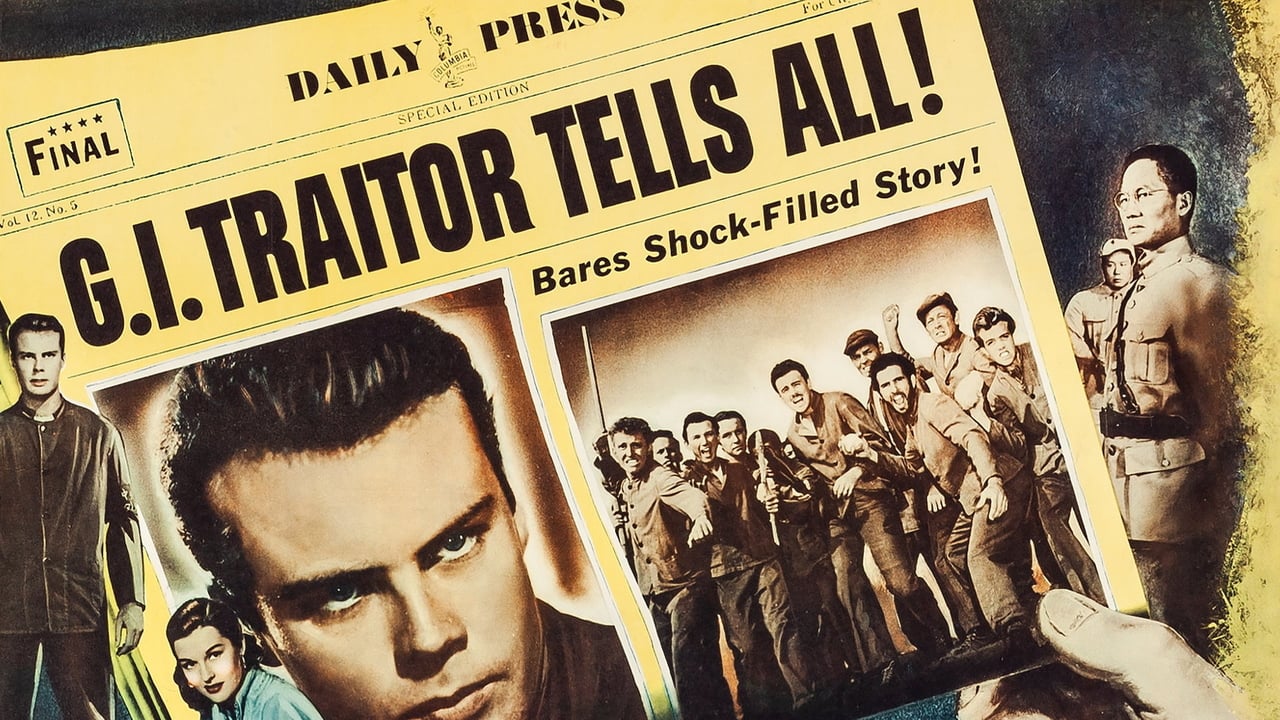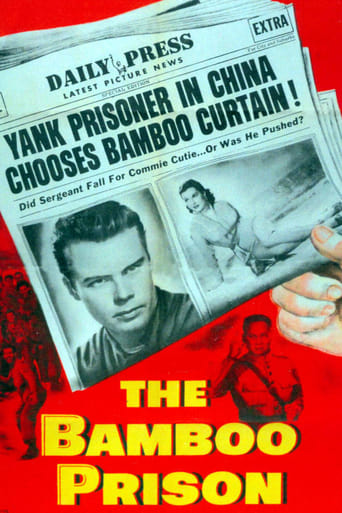

When the WWII drama "Stalag 17" came out in 1953, it had the benefit of the talents of Billy Wilder as director and writer. It was also co-written by Edwin Blum, whose talents I had never noticed before.But in 1954, "The Bamboo Prison" was released, also co-written by Edwin Blum. The film, like "Stalag 17", takes place in a POW camp. Though it's a Korean War camp, the similarities between the two scripts are noticeable, e.g. the main character (Sgt. John Rand played by Robert Francis) is hated by his fellow prisoners because he carves out a profitable and semi-comfortable life for himself while in captivity.But director Lewis Seiler is no Billy Wilder, Robert Francis is no William Holden, and "The Bamboo Prison" is certainly no "Stalag 17". Francis, who only appeared in four films before perishing in a crash of the plane he was piloting, tries to bring a weighty seriousness to his role, but struggles to carry the lead. His Sgt. Rand cooperates with the Communists and spouts anti-capitalist rhetoric that might have been polarizing in its day (right after the Korean conflict ended), but is often voiced by the political left in America today. Likewise the calculated black rights sentiments voiced by the Communists.The comedy elements feel forced and much less successful than in "Stalag 17". The opening scenes of a 40-day Bataan Death March-like struggle by the new prisoners feel tacked on and ineffective. In he end, there is little to recommend this shallow POW story.
... View MoreThe Bamboo Prison was made just about the time I was conceived, but it's taken 60+ years for me to finally get around to seeing it. Unfortunately, the plot and script both seem to poke around aimlessly, searching for a hot button to engage the audience. Finally, it serves up Communism as the failed ideology that it is, but underscores this point with tedious dialogue and little else. (I used to love action filled war movies as a child, but this one would have had me begging to go play in the dirt in no time at all.) You might think that the combined talents of E. G. Marshall, Brian Keith, and Robert Francis would save this one, but their acting skill are no match for the clumsy cinematic execution of The Bamboo Prison. It's obvious that this film was produced with little regard to set dressing, make up, or special effects.The prison camp set looks like left over buildings from Stalag 17 with some bamboo added here and there, the prisoners all appear very well fed and clothed, and the bombing raid depends on some stock footage of a Boeing dropping bombs which all happen to land in exactly the same area. Gun shots at a fleeing prisoner all land in a very straight line, evenly spaced, indicating little effort was spent planting the charges in the dirt for the impact effect.While not exactly terrible, this film is probably best viewed while sorting your sock drawer, clipping your nails, or as a cure for insomnia. I was hoping to see acting by the principals on par with some of their other films (Robert Francis - Caine Mutiny, E.G. Marshall - !2 Angry Men, or even Brian Keith in the Parent Trap), but this was not to be. Still, I'm happy to have watched the film so I can avoid it in the future. Your mileage may vary.
... View MoreThis thoroughly mediocre Korean War drama features Robert Francis as an American prisoner of war supposedly collaborating with his North Korean captors in an effort to help convince other Americans that Marx and Engels are the bees knees. The Bamboo Prison is burdened by endless talk about dirty commies and their filthy ideology, and isn't helped by a mediocre cast. Amusingly, the prison camp is described as 'the black hole of Calcutta' by a new POW when we can clearly see that it really doesn't look all that bad at all. By the time this dull screed plods its way towards the final reel, you'll be screaming for relief...or release. Even E. G. Marshall (here playing a pink priest) can't save this one.
... View MoreThe Korean war is known at the "forgotten war" for good reason: People wanted to forget it ever happened. It wasn't popular and it had a less than satisfactory conclusion. As a result, there was not many films on the subject. On the 60th anniversary of the Korean war, TCM showed nearly 24 hours of films on the subject, and this was one of them."The Bamboo Prison" is a reasonable attempt to portray the horrors of PoW life for United Nations soldiers in a Chinese prison. Starring Robert Francis as a PoW turned collaborator on a secret mission, this film is filled with all the usual trappings of the anti communist hysteria. The cast is pretty well rounded out with Brian Keith as a fellow PoW, E.G. Marshall as a counterfeit priest, Murray Matheson as the Russian adviser, Diane Foster as his ballerina/communist traitor wife, and Richard Loo as the camp commandant. A young Aaron Spelling plays an uncredited role.This film makes good fodder for the war film buff or the political historian, but not to be considered a cinematic masterpiece. Surely not a "Stalag 17" or "King Rat".
... View More